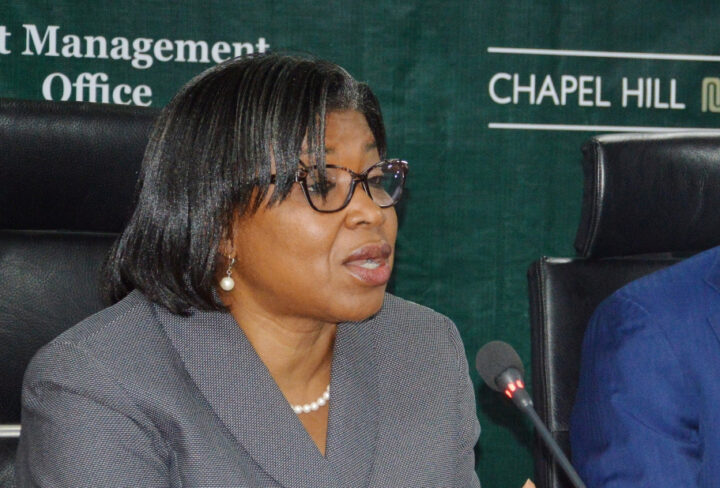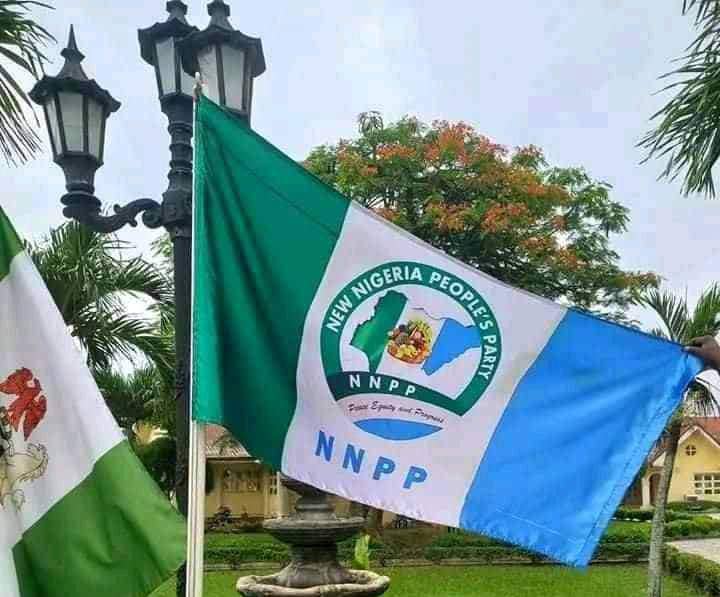Pic 18. From Left: Director-General of Debt Management Office (DMO), Patience Oniha; Chief Executive Officer, Nigerian Stock Exchange, Oscar Onyema and Minister of State for Environment, Usman Jibril during the official listing ceremony of the 13.48%, 5year, N10.69bn FGN Green Bonds in Lagos on Friday (20/7/18)
03805/20/7/18/Babatunde Atolagbe/ICE/NAN
The Debt Management Office (DMO) says there is an urgent need for the federal government to moderate the rising trend of borrowings to ensure debt sustainability.
Patience Oniha, director-general of DMO, said this on Thursday in Abuja at a workshop for legislators.
The workshop was organised for members of the senate committee on local and foreign debts and the house of representatives committee on aids, loans and debt management.
Oniha urged the federal government to take steps to rationalise expenditure, accelerate growth in revenues and ensure that borrowings were tied to projects that generate commensurate revenue to service the loans.
Advertisement
She said the outlook shows that local and international markets are becoming tighter and interest rates are rising.
“Thus, priority should be less on borrowing and more on revenue from oil and non-oil sources,” Oniha said.
“Nigeria’s public debt stock has grown consistently over the past decades and even faster in recent years. Consequently, debt service has continued to grow.
Advertisement
“Nigeria’s low revenue base, compounded by dependence on crude oil, resulted in deficits over the past decades.”
Oniha, however, noted that efforts at increasing non-oil revenue were yielding positive results.
She said government borrowings were usually obtained for the purposes of financing budget deficits, financing specific projects or activities, and to refinance maturing debt obligations.
The DMO boss said the processes of obtaining loans by the government were guided by the annual budgets and medium term expenditure framework, and the medium term external borrowing plan.
Advertisement
She also disclosed that there were also “stand-alone requests” from ministries, departments and agencies (MDAs), routed through the ministry of finance, budget and national planning.
According to Oniha, the country’s total public debt stock as at June stood at N42.8 trillion, comprising N26.2 trillion domestic and N16.6 trillion external debt stocks.
She explained that the debt to gross domestic product (GDP) ratio was 23.06 percent, while growth in total debt stock between 2021 and June 2022 was 8.08 percent.
“At this level, the debt to GDP ratio is still within Nigeria’s self- imposed limit of 40 percent,” Oniha said.
Advertisement
“It is also within the World Bank/IMF recommended limit of 55 percent for countries within Nigeria’s peer group and 70 percent for ECOWAS countries.”
Speaking on loans from China, Oniha said they amounted to $3.6 billion, constituting about 3.6 percent of the country’s external debt.
Advertisement
“The good thing is that Chinese loans are concessional. It is not our dominant source of funding,” she said.
“It is actually small but it finances infrastructure, which is a good thing.”
Advertisement
On his part, Clifford Ordia, chairman, senate committee on local and foreign debts, commended the DMO for its efficient management of the country’s debt.
Ordia said debt sustainability was an issue of concern due to low revenue, adding that urgent steps should be taken to boost revenues.
Advertisement
“We all came here today to deepen our capacity in debt management. Nigeria’s Debt to GDP ratio has been eliciting concern around debt sustainability,” he said.
“The important issue here is revenue growth to moderate the need for further borrowings, and for the DMO to fulfill its mandate of managing the debt effectively.”
Add a comment






